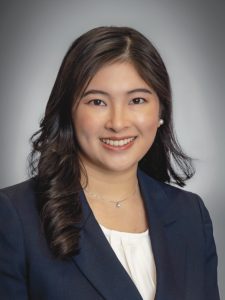By the time she reached the eighth grade, Lauren Hui, MS, knew she wanted to be a physician. She was even certain about the specialty.
When her class was assigned to give presentations about what they wanted to do in 20 years, Lauren was specific: she was going to be a neurosurgeon. She found their stories inspirational.
“It really touched me when I saw interviews with neurosurgeons,” she said. “They talked about the biggest gifts that they could give back to patients was time with their families. That really inspired me.”

Years later, when entering the Burnett School of Medicine at Texas Christian University, her career goal remained surgery. But her plans were about to change.
“As I entered my clinical rotations, I realized that it maybe wasn’t the best fit for me,” Lauren said. “I started exploring other paths.”
Her first diversion was toward pathology, but then a visit to the interventional radiology suite during rotations piqued her interest. The procedural side of the specialty aligned with her interests.
“I thought, ‘Hey, this is basically surgery, but we get to also interpret imaging,’ ” Lauren said. “There were so many new technologies that I was starting to learn, and that’s what got me into radiology.”
Radiology wasn’t totally a foreign concept to her. In her first year, a diagnostic radiologist offered occasional lessons during her anatomy class. Those initial interactions eventually sent her looking for more radiology experience.
“When I did more exploration, talking with mentors and people who actually matched into the specialty as well as an upperclassman who was applying that year, those conversations helped me to solidify and clarify what the specialty really was,” she said.
Family medicine physician Yun Tran, MD, MPH, served as Lauren’s preceptor from her first month of medical school until halfway through her third year. TCU has a longitudinal integrated clerkship for its medical students that gives them the chance to interact with patients in their first year. Dr. Tran is director of the program’s first phase.
“Lauren has been an enthusiastic learner from the very beginning and is very teachable,” said Dr. Tran, who’s also an assistant professor. “She is always reflecting on her own learning progress, setting goals, and implementing feedback I give her. She was an integral part of my team by assessing and presenting the patients, pending orders, making follow-up phone calls, and more. She helped the medical assistants and nurses, too. She is a self-starter but always seeks help when she needs it.”
Part of Lauren’s desire to enter medicine arose from her recognition of the need for medical professionals who share backgrounds with a diverse patient population. She is a first-generation American: her parents moved to California from Hong Kong, and she spoke Cantonese with her grandparents.
Her grandparents had chronic health issues, including her grandfather’s diabetes. She remembers seeing him pricking his fingers and being curious about it.
“As I got older and started to think about what I wanted to do, I knew that there was a need for healthcare providers that spoke the language that my grandparents spoke,” she said.
Lauren is in her final year of medical school and getting prepared to match next March. She feels especially ready after having worked with patients from early in her time at TCU.
“The strongest part of what I bring to the match is I have a lot of clinical hours starting from M1,” she said. “I feel really comfortable around a lot of different types of patients, including Spanish speaking ones. I even took a medical Spanish elective.”
Lauren is applying to programs across the country, including the West Coast, where she grew up and has family. If she doesn’t match in the Dallas-Fort Worth area, she said she will miss living there. She is part of a running club with people from outside the medical field, and her fiancée is an aerospace engineer and native of the region.
In her first year of studies, she was asked to record a video about her positive experiences living in North Texas and attending Burnett.
“I honestly can’t imagine where I’m going to end up,” she said. “I’m excited for what’s going to come next, but I’m also thinking, ‘Oh my gosh, I’m going to miss Fort Worth.’ I’ve built a little community here.”


